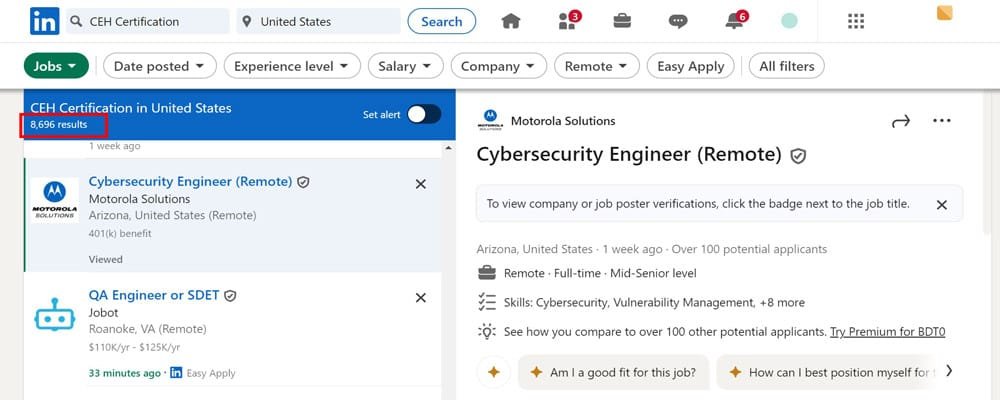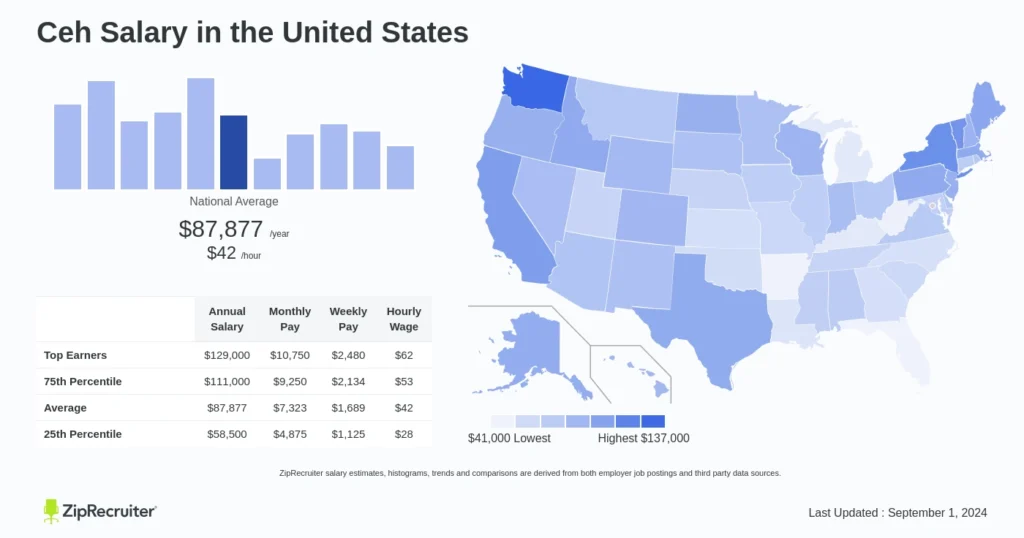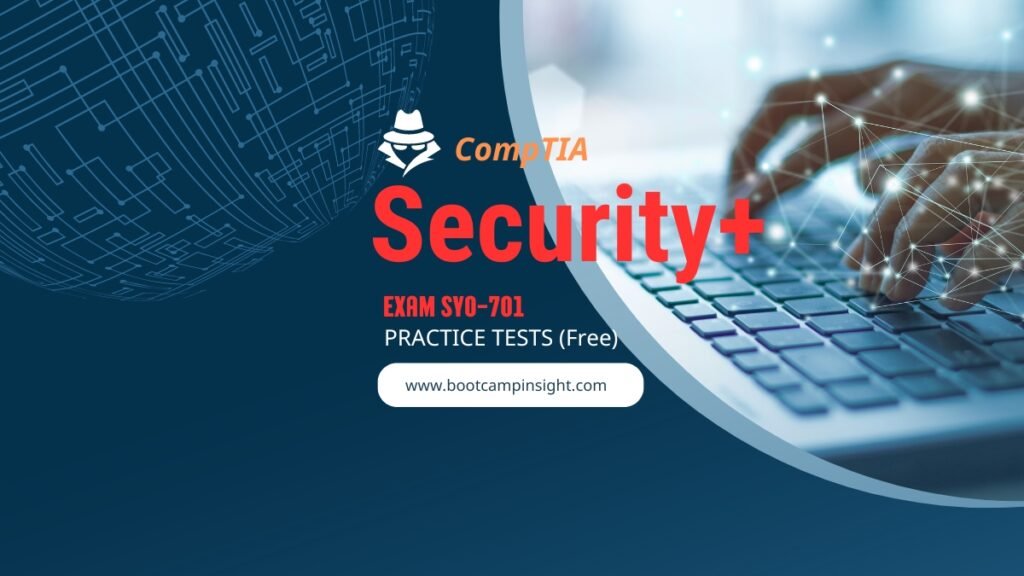As the field of cybersecurity continues to evolve, professionals are constantly seeking ways to stay relevant and expand their expertise. One of the most popular certifications for ethical hackers is the Certified Ethical Hacker (CEH) certification, offered by EC-Council. But the question for many is: Is CEH worth it? In this article, we’ll explore the value of CEH certification in 2025, covering everything from job prospects and salaries to the skills you’ll acquire and the overall return on investment.
Table of Contents
What is CEH Certification?
The Certified Ethical Hacker (CEH) certification, administered by EC-Council, is designed to teach professionals how to think and act like a hacker. The goal is to equip cybersecurity experts with the skills needed to find vulnerabilities and secure their organizations against cyber threats. The CEH certification covers a broad range of topics, from network scanning and enumeration to system hacking, malware threats, and social engineering.
The CEH exam consists of 125 multiple-choice questions and spans 4 hours, testing candidates across five core areas, including attack vectors, countermeasures, hacking technologies, and tools. EC-Council has also introduced the CEH Practical, an optional hands-on exam that validates the practical application of ethical hacking skills. Together, these exams help professionals prove their competence in penetration testing and ethical hacking.
Examining the Value of CEH Certification

Is CEH worth it for cybersecurity professionals? The short answer is yes—if it aligns with your career goals. If you are planning to break into ethical hacking or advance in their cybersecurity careers the CEH certification can offer you with several advantages.
Relevance of CEH in the Cybersecurity Industry
With the rise in cyberattacks, the demand for ethical hackers has reached unprecedented levels. Organizations across various sectors, from government agencies to Fortune 500 companies, are actively seeking professionals with CEH certification to safeguard their systems from malicious threats. On October 19th, 2024, there were 8,696 job openings for ethical hackers listed on LinkedIn alone. When you consider all job platforms and openings throughout the year, this number is likely much higher, reflecting the growing demand for certified ethical hackers.

How CEH Can Improve Your Salary
According to ZipRecruiter (as of October 12, 2024), the average annual salary for a CEH-certified professional in the United States is $87,877, which works out to be approximately $42.25 an hour. This translates to about $1,689 per week or $7,323 per month.
Salaries for CEH-certified professionals can vary significantly. ZipRecruiter reports that while some salaries are as high as $137,000 and as low as $41,000, most fall within the range of $58,500 (25th percentile) to $111,000 (75th percentile). The top 10% of earners make up to $129,000 annually. This wide salary range, which can vary by as much as $52,500, suggests there are many opportunities for growth, with salary increases based on factors like skill level, location, and experience.

Cost of CEH Certification
The cost of earning the CEH certification can vary based on the training materials and courses you choose. The certification itself typically costs between $950 and $1,199, depending on whether you take the exam on its own or opt for a bundle that includes study materials. Here is breakdown for CEH Certification cost for you:
| Cost Component | Description | Typical Cost (USD) |
|---|---|---|
| Exam Voucher | Official voucher to take the CEH exam. | $1,199 (Direct from EC-Council) or $950 (Pearson VUE Center) |
| Exam Administration Fee | Fee charged by the testing center. | $100 |
| Training Course | Optional but highly recommended. Can be self-paced or instructor-led. | Varies widely based on provider and format. Can range from $1,000 to $3,499 or more. |
| Study Materials | Books, practice exams, etc. | Varies. Can be purchased separately or bundled with training courses. |
The cost of CEH certification may seem steep, many professionals find the return on investment well worth it, as it often leads to higher-paying jobs and new career opportunities.
CEH Certification Exam Details
The CEH exam is designed to test candidates’ knowledge of various hacking techniques, tools, and methodologies. It consists of 125 multiple-choice questions and has a 4-hour time limit. To pass, candidates must score at least 60-85%, depending on the difficulty of the questions.
For those looking to take their skills further, EC-Council also offers the CEH Practical exam. Unlike the multiple-choice format of the standard CEH exam, CEH Practical involves real-world simulations where candidates must demonstrate their ability to identify vulnerabilities, analyze systems, and conduct penetration tests.
Pre-requisites for CEH
While there are no strict educational or professional experience requirements to sit for the CEH exam, EC-Council recommends that candidates have at least two years of work experience in the field of information security. Alternatively, candidates without this experience must complete an EC-Council-approved CEH training course before being eligible for the exam. This ensures that even those new to cybersecurity receive the foundational knowledge needed to succeed.
In summary, the pre-requisites are:
- Two years of work experience in information security, or
- Completion of an EC-Council-approved training course for those without the necessary experience.
Who Should Take the CEH?
CEH is suitable for both entry-level and experienced professionals. If you’re an experienced IT professional or just starting out, CEH can provide you with the knowledge and skills necessary to identify, assess, and mitigate vulnerabilities in information systems. CEH is particularly suited for individuals working in roles such as:
- Cybersecurity Analysts
- Security Consultants
- Penetration Testers
- Information Security Managers
- IT Security Architects
- Chief Information Security Officers (CISOs)
Skills Covered in CEH
The Certified Ethical Hacker (CEH) certification provides a comprehensive foundation in ethical hacking, enhanced with the latest advancements in cybersecurity. Key skills covered include:
- Reconnaissance and Footprinting: Techniques for gathering essential information about targets.
- Network Scanning and Vulnerability Analysis: Identifying and assessing system weaknesses.
- Gaining and Maintaining Access: Exploiting vulnerabilities and ensuring sustained access securely.
- Clearing Tracks: Methods to erase evidence of hacking activities.
- System Hacking and Malware Threats: Understanding and mitigating various malware and hacking techniques.
- Social Engineering and Sniffing: Tactics for manipulating individuals and intercepting data.
- Denial-of-Service (DoS) Attacks: Strategies to execute and defend against DoS attacks.
- Web and Application Hacking: Exploiting vulnerabilities in web servers and applications.
What’s New in CEH v13?
CEH v13 introduces several enhancements to keep pace with the rapidly evolving cybersecurity landscape:
- AI Integration: Incorporates AI-powered tools and techniques across all phases of ethical hacking, improving efficiency and effectiveness.
- Updated Curriculum: Includes the latest threats such as AI-driven attacks, cloud security vulnerabilities, and Internet of Things (IoT) security challenges.
- Enhanced Practical Training: Features over 221 hands-on labs in a cloud-based cyber range, allowing learners to practice in realistic environments.
- Advanced Exam Structure: Combines knowledge-based and practical exams to better assess real-world hacking skills.
- Focus on Emerging Technologies: Covers hacking techniques related to quantum computing, machine learning security, and advanced cryptography.
This streamlined section highlights the essential skills covered in the CEH certification and succinctly outlines the new features introduced in CEH v13, providing a clear and engaging overview without overwhelming detail.
CEH vs. Other Ethical Hacking Certifications
While CEH is a popular certification for ethical hackers, it’s important to compare it with other certifications to ensure it’s the right choice for you. Here’s a comparison of CEH with other ethical hacking certifications:
- CEH vs. OSCP: OSCP is more hands-on and practical than CEH, which focuses more on theory. OSCP is often seen as a better choice for penetration testers who want to demonstrate advanced hacking skills.
- CEH vs. CISSP: CISSP is a broader certification covering overall security management, while CEH focuses on hacking techniques. CISSP is typically aimed at security managers and CISOs.
- CEH vs. CompTIA PenTest+: CompTIA PenTest+ is a newer certification focused on penetration testing. It’s less well-known than CEH but is growing in popularity.
CEH Certification ROI (Return on Investment)
While the upfront costs of CEH certification can be significant, the return on investment is often worth it. According to Payscale, CEH-certified professionals can see salary increases of up to 20-30% after earning their certification. In some cases, professionals report that the certification helped them land higher-paying jobs or promotions, allowing them to recover their investment in a matter of months.
Future of CEH: Is It Still Relevant?
In an industry as fast-paced as cybersecurity, the question of relevancy is crucial. Fortunately, the CEH certification remains highly relevant. EC-Council continuously updates the curriculum to address new cyber threats, such as cloud vulnerabilities, AI-driven attacks, and IoT security. As the demand for ethical hackers continues to grow, CEH certification is likely to remain a valuable asset for years to come.
Cons of CEH
Although the CEH certification is widely recognized and valued, there are a few potential drawbacks to consider:
- Experience Requirement: To take the CEH exam, you need at least two years of experience in information security or a related IT field, and this experience must be verified by EC-Council. If you do not meet this requirement, you will need to complete an EC-Council-approved training course, which adds time and effort to the certification process.
- Cost: The certification can be expensive, with costs ranging from $950 to $4,000 depending on the package and training options you select. This includes the exam fee, training materials, and potential additional costs for retakes, remote proctoring, or professional background checks.
- Broad Focus: While CEH covers a wide range of topics, some professionals find the certification too general and prefer more specialized certifications like OSCP for penetration testing or CISSP for security management.
- Practical Application: Although CEH has introduced hands-on labs, some critics argue that other certifications, such as OSCP, offer more in-depth, hands-on experience in real-world environments.
Is CEH Worth it?
If you’re looking to advance your career in ethical hacking or cybersecurity, the answer is a resounding yes. CEH certification offers a range of benefits, from increased job opportunities to higher salaries. While it comes with its costs, the potential return on investment makes it a worthwhile certification for many professionals.
FAQs
Is CEH certification enough to become an ethical hacker?
CEH is a great starting point, but gaining real-world experience and considering additional certifications like OSCP can further strengthen your skills.
How much does the CEH exam cost?
The CEH exam costs between $950 and $1,199, depending on the option you choose.
Can I get a job with just CEH certification?
Yes, many entry-level and mid-level cybersecurity roles prefer candidates with CEH certification, especially in penetration testing and security consulting roles.
What is the pass rate for the CEH exam?
The pass rate varies, but candidates need to score between 60-75% depending on the complexity of the questions.
Is CEH better than OSCP for beginners?
CEH is more theory-based and can be a good starting point for beginners, while OSCP is hands-on and more challenging, ideal for those with some experience.
How long does it take to get CEH certified?
On average, it takes 2-3 months of study and preparation to pass the CEH exam, depending on your prior knowledge.
What is the average salary for a CEH-certified professional?
The average salary for CEH-certified professionals ranges from $41,000 to $137,000, with an average of $87,877 depending on experience and job role.
Which ethical hacking certificate is the cheapest to get?
CompTIA PenTest+ is one of the more affordable ethical hacking certifications, with exam costs $404 (in USA), making it cheaper than CEH and OSCP.



